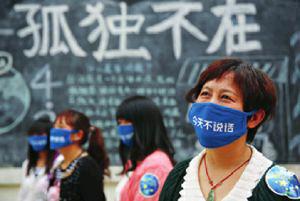No Words Today
2014-05-08
People in Xian, capital of northwest Chinas Shaanxi Province, wear masks with “No Words Today” printed on to express their support for autistic children on April 2, World Autism Awareness Day. China now has more than 1.6 million children with autism, according to researches.
PX Controversy
The construction of a petrochemical plant in Maoming in south Chinas Guangdong Province will be halted if the majority of residents object to it, the municipal government has announced.
“We are at a stage of disseminating information relating to the paraxylene(PX) project,” a municipal government spokesman told Xinhua News Agency on March 31 anonymously, adding that the local government would not go ahead with the project without consulting the public.
More than 1,000 locals staged protests on March 29 and 30 in front of the government building to express their objection to the project.
Since 2007, PX projects planned in Xiamen in Fujian Province, Dalian in Liaoning Province and Kunming in Yunnan Province have been shut down after residents protested, as they be- lieved that the facilities would threaten the local environment. PX is a material used for making a number of polyester products.
Maoming is a major Chinese petrochemical production base. The PX project was approved in 2012 with an annual production capacity expected to meet 600,000 tons.
Carbon Trading
Central Chinas Hubei Province launched the countrys sixth carbon trading scheme on April 2.
The scheme covers 138 companies in 12 high pollution industries, including power generation and steel, which have been given a combined carbon emission quota of 324 million tons for this year, the Hubei Carbon Trade Exchange said in a statement.
Under the trading program, those which emit below their quotas can sell their excess to other enterprises or investors for profit. Hebei is the first place where the government has sold reserve quotas. About 2 million tons of carbon have been sold at a price of 20 yuan($3.22) per ton.
The exchange also signed carbon trading agreements with other provinces including Shanxi, Anhui, Jiangxi and Guangdong.
The scheme is a big step forward for China in building a nationwide carbon trading market, with an expectation of 40- to 45-percent reductions of 2005s emissions slated for 2020.
Terrorists Arrested
Four suspects from the Kunming terror attack have been arrested for the crimes of organizing, leading, taking part in a terrorist attack and intentional homicide, the Yunnan provincial procuratorate said on March 29.
A group of knife-wielding assailants attacked civilians at a railway station in Kunming, the provincial capital of southwest Chinas Yunnan Province, on the evening of March 1, causing 29 deaths and injuring another 143.
Police shot and killed four of the attackers at the station. The other four were captured and detained by police on March 3.
Care for Elderly
China on March 28 established its first government-sponsored national fund specially designed for aged parents who have lost their only child.
The fund, which has raised donations worth more than 10 million yuan($1.61 million), will be under the direct supervision of the Ministry of Civil Affairs.
It will offer life assistance and psychological counseling to these elderly with financial difficulties by giving aid directly or through communities and nursing homes, according to Han Xuechen, director of the fund.
The fund is currently sponsoring pilot programs in cooperation with a subdistrict in Beijing and the earthquake-hit Beichuan County in southwest Chinas Sichuan Province, according to Han.
If successful, the plan is for the program to be gradually expanded.
China is undergoing a fast transfor-mation and 202 million, or 14.9 percent of the total population, were aged 60 or above at the end of 2013, said Vice Minister of Civil Affairs Dou Yupei.
This number is expected to exceed 300 million by 2025, and a large number of them will also lack children and need special care from society, according to Dou.
Logging Ban
Heilongjiang Province in northeast China will ban commercial logging of its natural forests from April 1.
The measure was important in restoring the nations forest resources and insuring ecological security, said Zhao Shucong, chief of the State Forestry Administration.
He said that industries such as tourism and green agriculture should be developed as substitutes for logging.
Heilongjiang is home to 18.5 million hectares of state forests.
Ocean Regulation
China will issue a policy on regulating the countrys maritime area commercial use via tender, auction or listings in 2014, said the State Oceanic Administration (SOA) on March 31.
According to a SOA guideline on sea area management in 2014, it will improve the system of maritime property deals and jointly release a mortgage policy on the right of maritime use with the central bank.
The administration will make utmost efforts to complete the establishment of county-level oceanic functional zones and improve a threetier oceanic zone system including national, provincial and city and county levels, the guideline said.
The SOA will also tighten implementation of the countrys sea reclamation plan, establish a multilevel coastal protection mechanism, and promote the protection and use of provincial-level coastlines.
CAS Ranking
The Chinese Academy of Sciences (CAS) topped the Asia-Pacific region in the Nature Publishing Index (NPI) released on March 27, a benchmark for research success and achievement.
The CAS was ranked sixth in the NPI 2013 Global Top 200, up eight positions from the previous year. The University of Tokyo was ranked eighth in the global list and second in the AsiaPacific region.
The CAS published 165 articles in Nature, a well-known scientific journal, in 2013.
University of Science and Technology of China, affiliated with the CAS, ranked 57th in the global list and tops the Chinese universities on the list.
Harvard University, Massachusetts Institute of Technology and Stanford University, all in the United States, were the top three on the global list.
The NPI ranks institutions according to the number of primary research articles they publish in the Nature journal, regarded as a pre-eminent platform for publication of international research.
Medical Progress
A woman displays how to operate a piece of medical equipment at the 26th International Medical Instruments and Equipment Exhibition in Beijing on March 21.
On March 31, the Chinese Government unveiled a new regulation on the supervision of medical equipment.
Under the new rule, medical equipment in China will be registered and divided into three categories based on the potential health risks they might pose to the public.
The regulation will come into effect on June 1.
Heavy Rain
Local residents make their way through a flooded street in Foshan City, Guangdong Province, on March 31.
Rain and hail had hit south China since March 29, triggering landslides in mountainous areas.
At least 21 people had died and four had been reported missing by April 1, according to the Ministry of Civil Affairs.
More than 1 million people were affected across the six provincial-level regions of Fujian, Jiangxi, Guangdong, Guangxi, Hunan, Guizhou and Chongqing.
More Quotas
China granted new investment quotas of 29 billion yuan ($4.7 billion) to qualified foreign institutional investors(QFIIs) in March as the country moves cautiously to encourage capital flows.
Of the quota, $1.45 billion was granted to six investors under the QFII program, and 20.1 billion yuan ($3.24 billion) was made to renminbi-denominated qualified foreign institutional investors (RQFIIs), according to data from the State Administration of Foreign Exchange.
Chinas currency, the yuan, is convertible for trade purposes under the current account, while the capital account, which covers portfolio investment and borrowing, is still largely controlled by the state over concerns of abrupt capital flows moving in and out of the country.
To gradually open the capital account, QFII and RQFII programs were introduced, under which foreign investors are given a certain quota to move money into Chinas capital account, to encourage flows.
As of March 28, 241 overseas institutions have received QFII quotas amounting to $53.6 billion, and the volume under the RQFII scheme totaled 200.5 billion yuan ($32.3 billion).
PMI Expands
The purchasing managers index (PMI) for Chinas manufacturing sector rose to 50.3 percent in March, up from 50.2 percent in February.
It is the first month-on-month rise since November, according to a statement jointly released by the National Bureau of Statistics (NBS) and the China Federation of Logistics and Purchasing.
The index shows Chinas manufacturing sector is stable, said Zhao Qinghe, a senior analyst with the NBS, who attributed the rise to the resumption of production and business after the Spring Festival holiday (January 31-February 6).
Meanwhile, the PMI for the nonmanufacturing sector stood at 54.5 percent in March.
Surging External Debt
Chinas outstanding foreign debt had hit $863.2 billion by the end of 2013, up 17 percent over the previous year, data from the countrys forex regulator showed on March 31.
Of the total outstanding external debt, registered external debt reached$526.7 billion, while the balance of trade credit between businesses amounted to$336.5 billion.
